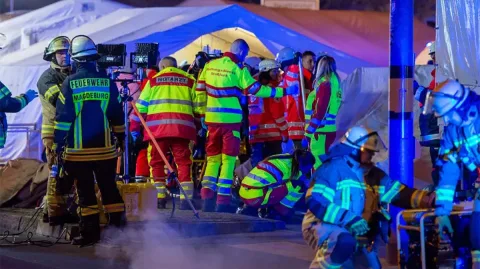The leaders of Kenya, Uganda and Somalia have vowed to defeat Islamist al-Shabaab rebels in Somalia,…
 The leaders of Kenya, Uganda and Somalia have vowed to defeat Islamist al-Shabaab rebels in Somalia, saying the region had a “historic opportunity” to restore security in a country that has come to be defined by its lawlessness.
The leaders of Kenya, Uganda and Somalia have vowed to defeat Islamist al-Shabaab rebels in Somalia, saying the region had a “historic opportunity” to restore security in a country that has come to be defined by its lawlessness.
A month after Kenyan troops pushed into neighbouring Somalia to fight the insurgents, concerns are mounting about the scope and purpose of the country’s first cross-border military operation since independence in 1963.
Kenyan troops have made rapid territorial gains against the al-Qaida linked insurgents since they invaded southern Somalia on 16 October. But heavy rains have stalled efforts to defeat an enemy that can easily melt away into the local population and disrupt Kenyan supply lines.
The Kenyan president, Mwai Kibaki, met his Ugandan counterpart, Yoweri Museveni, and Somalia’s leader, Sheikh Sharif Ahmed, on Wednesday.
Uganda has thousands of peacekeeping troops in Somalia.
“The joint Kenya-Somalia operation presents the region with a historic opportunity to restore stability and security in Somalia,” said the Kenyan foreign minister, Moses Wetangula.
Kenya’s incursion, however, is both ambitious and ambiguous.
It is ambitious because bigger, battle-hardened armies have tried to pacify its anarchic Horn of Africa neighbour before, and failed – the United States in the early 1990s and Ethiopia in 2006.
It is ambiguous because no one seems to know what Kenya wants to do or why are they doing it now.
Kenyan military and political leaders have set their sights on the southern port city of Kismayo, described by International Crisis Group analyst Rashid Abdi as “the jewel in the crown of al-Shabaab’s territorial control”.
David Shinn, a former US ambassador to Ethiopia, says Kenya must pull out of Somalia soon, whether or not it takes Kismayo.
“The longer it remains, the greater al-Shabaab’s argument will resonate with Somalis that a foreign force has invaded,” he said.
Mohamed, a Kenyan-Somali who was born in northern Kenya but lived for years in Kismayo, concurs, saying the city’s people do not support the rebels and will welcome Kenyan troops. What happens after that will, however, be critical to the fate of the Kenyan operation.
“If the Kenyans want control, this is a problem. If they try that, al-Shabaab will get support from society,” said Mohamed, an accountancy graduate.
Kenyan officials say they were forced to intervene in Somalia after a series of kidnappings and cross-border attacks. Al-Shabaab denies involvement in the abductions.
Analysts say the military campaign must have been at least a year in the planning. Discussions about setting up a buffer zone in southern Somalia to protect Kenyan interests and facilitate the return of Somali refugees, date back even further.
There may also be political motives. Kenya is due to hold presidential elections next year, the first since widespread post-election violence in late 2007.
The incursion has won broad political support, but as the weeks roll by with no clear military victory, critics are beginning to raise their voices.
Writing in Nairobi newspaper the Star, lawyer Irungu Kangata argued the war was illegal and costly, and urged Kenyan troops to pull out immediately.
“The worst case scenario is unfathomable. A humiliated Kenya defeated by al-Shabaab, wasting millions of shillings in a long drawn-out war,” Kangata wrote.
So far the incursion has been low on body count and high on public support, but that could change. Al-Shabaab has threatened “cataclysmic consequences” for Kenya and there have been two grenade attacks in Nairobi and a series of bomb and gun attacks in the north.
Kenyan forces have not engaged in any major battles, but there is a daily trickle of reported skirmishes. Abdi says Kenyan forces, although well-trained and equipped, might not be prepared for urban warfare in Kismayo and should work with others, such as the African Union peacekeeping force.
The 9,000-strong Amisom force has been confined to Mogadishu, where it has made gains against al-Shabaab, but commanders say it does not have the manpower or funds to go further.
Some of the scenarios mooted, should Kenya succeed in ousting al-Shabaab, include replacing Kenyan troops with a beefed-up Amisom, possibly rebranded as a UN force. Another idea would be to set up a semi-autonomous state, called Jubaland.
Kenyan military officials have said they have no appetite to seize territory.
It is no secret that Kenya would like to send home some of the nearly 500,000 refugees in the Dadaab camp, where thousands of Somalis have lived for generations with grandchildren born among the huts and tents. If there were a buffer zone, it could exert pressure on international donors to do just that.
Dadaab’s population surged this year as thousands of people fled both violence and a famine made worse by al-Shabaab’s refusal to allow aid into the south.
Whatever Kenya’s motives, Shinn doubts the incursion can create a durable solution for Somalia, where the weak Transitional Federal Government has failed to extend its control beyond Mogadishu.
“Al-Shabaab will eventually fail because of its own mistakes such as the mishandling of the famine. Kenya, Ethiopia, Djibouti, other regional players and the international community can make a difference on the margins if they choose smart policies. Ultimately, Somalis are going to determine the outcome.”
Source: The Guardian





